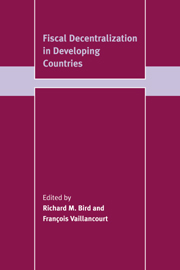Book contents
- Frontmatter
- Contents
- List of tables
- List of contributors
- Preface
- 1 Fiscal decentralization in developing countries: an overview
- 2 China: evaluating the impact of intergovernmental fiscal reform
- 3 India: intergovernmental fiscal relations in a planned economy
- 4 Indonesia and Pakistan: fiscal decentralization – an elusive goal?
- 5 Morocco and Tunisia: financing local governments – the impact on infrastructure finance
- 6 Colombia: the central role of the central government in fiscal decentralization
- 7 Argentina: fiscal federalism and decentralization
- 8 South Africa: an intergovernmental fiscal system in transition
- 9 Bosnia-Herzegovina: fiscal federalism – the Dayton challenge
- Index
4 - Indonesia and Pakistan: fiscal decentralization – an elusive goal?
Published online by Cambridge University Press: 09 October 2009
- Frontmatter
- Contents
- List of tables
- List of contributors
- Preface
- 1 Fiscal decentralization in developing countries: an overview
- 2 China: evaluating the impact of intergovernmental fiscal reform
- 3 India: intergovernmental fiscal relations in a planned economy
- 4 Indonesia and Pakistan: fiscal decentralization – an elusive goal?
- 5 Morocco and Tunisia: financing local governments – the impact on infrastructure finance
- 6 Colombia: the central role of the central government in fiscal decentralization
- 7 Argentina: fiscal federalism and decentralization
- 8 South Africa: an intergovernmental fiscal system in transition
- 9 Bosnia-Herzegovina: fiscal federalism – the Dayton challenge
- Index
Summary
Responding to a wide variety of concerns ranging from citizen disenchantment with national government failures to globalization, a large and growing number of developing countries (seventy at last count) have expressed a commitment or a desire to achieve a greater degree of decentralization. While there has been reasonable agreement on an economic framework to guide such reform efforts (see Shah, 1994) and often a reasonable national consensus on directions for reform, progress on such reform efforts has proceeded at a frustratingly slow pace in the majority of these countries. This chapter reviews the experiences of two large and diverse countries in reforming their fiscal systems, with a view to developing a better understanding of the potentials and perils of such efforts in developing countries. First, reasons are stated for our selection of the countries to be discussed. This is followed by discussions of their fiscal systems. A subsequent section reflects upon why the road to reform has been so difficult in the two countries. A final section draws some lessons of general interest to other reforming countries.
Indonesia and Pakistan represent interesting case studies in federalism for two reasons. First, the reform of fiscal systems is high on the policy agenda in both countries and innovative approaches to the design of intergovernmental fiscal relations have been followed. Second, in both countries, impediments to reform are arising less from a lack of institutional capacity at the local level and more from “rent-seeking” (the pursuit of enlightened self-interest) by bureaucratic and political elites.
- Type
- Chapter
- Information
- Fiscal Decentralization in Developing Countries , pp. 115 - 151Publisher: Cambridge University PressPrint publication year: 1999
- 4
- Cited by



